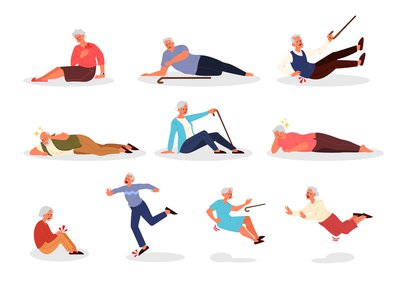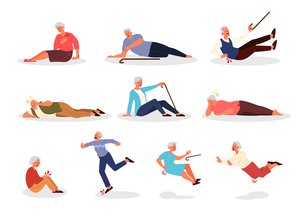
The majority of adults over 65 years old experience falls. Actually, many elderly people suffer serious injuries because of accidental falls.
Causes of falls include ageing, loss of balance, poor eyesight and hearing, sicknesses, poor lighting, etc. Side effects of medications can also cause you to slip or stumble. Family members and home care providers must find ways to lower the risk of falling to help older folks stay healthy and live longer.
So, what do you need to do to prevent and reduce the falling risk?
5 Tips...
1. Keep your relative active
It is scientifically proven, that you start to slow down as you grow older. However, this does not mean that you stop engaging in exercise. Remember to promote physical health whilst ageing. Staying fit in old age contributes to body and emotional wellbeing. You have many options. Yet, walking (although low-impact) can prove to be helpful. Physicians often advise older people to spend a minimum of 150 minutes of reasonable exercise weekly. At least 30 minutes of walking daily will help you achieve this goal.
Yoga positions and meditation can also help. Even while seated, you can exercise to reduce feelings of stress and depression. Older people can devote 10 hours in a sitting posture for a better quality of life. Additionally, try joining a club for older people in your community. These organisations and special interest groups can keep ageing individuals moving and active. These communities also promote seniors to start eating healthy. The right diet provides many nutrients. Make sure to consume foods high in fibre, rich in minerals and low in salt or sodium. The key should be to eat a well-balanced diet.
2. Remove all hazards at home
Next, get rid of all fall and trip hazards inside their home. Go through rooms and areas where seniors walk around. Remove rugs and carpets, excess furniture, and other obstacles. However, leave adequate space for the wheelchair, walker and sticks. Clear the stairs and hallways of clutter. Fix electric wires so these will be out of the passages. Install a shower seat in the bathroom and nightlights to guide the elderly especially at night and early morning hours. Do not forget the bathroom where most accidents happen. Fix all slippery surfaces. Likewise, install safety rails for support in the bathtub and shower.
3. Consider changing footwear
Choose the right footwear for your older relative. You must avoid uncomfortable, unfit and slippery soles. Instead, wear the right shoes. These will help maintain your balance, improve your bearing and reduce the possibility of falling or slipping. Remember that ill-fitting footwear can cause pain and discomfort in the heels and toes. Shoes should be strong and provide enough support. They should stay on your feet particularly while walking.
Non-slip shoes have soft rubber soles that stick to the floor’s surface. These will ensure safety, especially on wet or slippery flooring. Likewise, shoes must be made from lightweight materials. Try running shoes because many adults use this kind of footwear even for day-to-day walking. Lastly, go for low or flat heels for maximum stability and safety. The heels should not be more than one inch high for the best results.
4. Emergency phone systems
Your loved one will need an emergency phone especially when alone in the house. It will allow them to seek medical assistance in case of a fall accident or unforeseen emergencies. In like manner, easy access to such gadgets helps you maintain your independence. You can still enjoy living on your own while having a phone to call a relative, friend or caregiver. Besides, it gives peace of mind to your next of kin. It means that you will remain safe while family members attend to their everyday routine and responsibilities.
5. Schedule an appointment with their GP
Seniors must visit their GP regularly. This becomes necessary as you age. For one, you need to monitor the dosage of prescription medicines and stop taking those which may cause negative or harmful effects. Most elderly adults take medications for hypertension, heart ailments and pain. These often lead to side effects like hazy vision, dizziness, etc. which causes falls. Therefore, only the medical professional can stop the medication or reduce the dosage. At the same time, frequent visits to the doctor will also guarantee that you obey all clinical protocols and maintain a healthy weight.
It will do you no harm to be careful all the time even in the comfort of your own home. Hopefully, these tips will help you to remain safe and healthy all the time.
Are you looking for care for your loved one? TrustedCare can support you with your search!
Call us on 01865 638018
Send message

